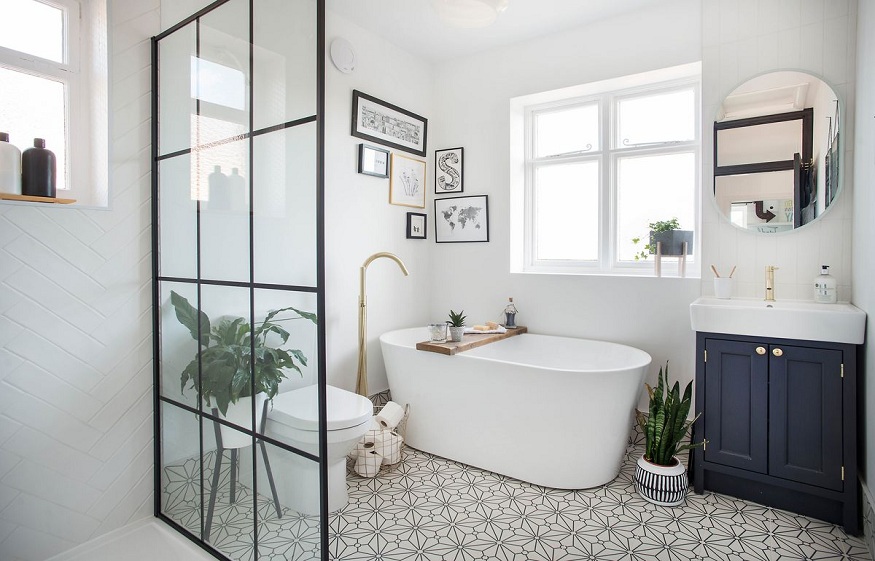Which Is The Best Flooring For The Bathroom?
They must be resistant, decorative and non-slip.
The criteria we use to choose the flooring for our house do not work for the bathroom floor. This is a particular space in which the presence of water and humidity imposes specific requirements. Below we will try to unravel the keys to finding the best floors for the bathroom, taking into account the characteristics of the most common materials in this space.
Damp proof
The bathroom is a highly used space that needs a resistant and durable floor. Being a humid area, it is essential to choose a material that can withstand splashes of water and humidity. This leaves out of the equation some materials such as wood, for example, which are perfect for other spaces in the house but are not so suitable for the bathroom.
safety first
In the bathroom, due to the humidity and the water that can fall on the floor, it is easy to slip. We get out of the shower barefoot and wet, and we can stumble and have an accident. That is why it is essential to choose a floor with a non-slip finish that minimises this possibility.
Some materials, natural stone, for example, can be more slippery than others, and it is essential to take this into account when choosing, especially if it is a bathroom used by children or the elderly.
Wood, yes or no?
If you love wood in all its versions, you will indeed like floors made of this material, also for the bathroom. However, it is not highly recommended because it does not withstand humidity well, and water can deteriorate it in a short time.
Sometimes tropical woods are used for these spaces, more suitable in humid environments, which, in addition, must be appropriately treated. If you like wood and you don’t want to give up its beauty and warmth, you can try to choose another material that imitates its appearance.
Technological advances have made it possible for other, more resistant materials to successfully imitate the grain and shades of wood, such as porcelain or vinyl flooring.
Natural stone, elegant and glamorous
Marble, granite, slate, limestone, etc. Natural stones are a very decorative material for the bathroom floor. There are many options to choose from, so it is not difficult to find a model you like.
However, not all benefits. There are also some drawbacks when choosing a natural stone. To begin with, it is a relatively expensive material, not affordable for all budgets.
In addition, it requires some maintenance. Being a porous material, it is necessary to clean, polish and seal it from time to time. Otherwise, it will stain irremediably.
As with wood, other materials mimic the appearance of natural stone, and that can be a more practical and economical option.
Bet on ceramics
Although it is a traditional covering, ceramic or stoneware has not lost a bit of modernity, as it has managed to update itself over time. It is pretty resistant and perfectly withstands humidity, so you can choose it without fear of the bathroom flooring.
One of the advantages of choosing ceramics is the wide variety of designs, models and formats. You find flooring with a non-slip and antibacterial finish.
One piece of advice: if you choose XXL-sized pieces, your floor will have fewer joints and be easier to clean.
Porcelain, one step further.
Porcelain stoneware is a more advanced material than ceramic. Although they share the same raw material and manufacturing method, porcelain tile is subjected to a higher temperature and pressure, thus achieving a denser, more resistant and waterproof coating.
In addition to offering you various models and designs, it is also non-slip, perfect for wet spaces such as the bathroom. Porcelain does not require any maintenance and is very easy to clean.
The versatility of vinyl floors
It is one of the most innovative materials for the floor of the whole house, including the bathroom. As it is made from PVC, it withstands humidity without problems, as long as the joints between the pieces are well sealed.
The most crucial advantage that vinyl floors offer is the ease with which they are installed, without the need for time-consuming work. To begin with, it is not necessary to remove the old floor, but it can be installed on top of it. The installation method can be self-adhesive or with a click system, in which the pieces are inserted into each other very quickly.
For daily cleaning, it will suffice to pass the vacuum cleaner or a soft mop. If you have any stains, they will come out quickly with a microfiber cloth and neutral soap. Vinyl floors can be easily mopped with a mop.
Microcement, the modern finish
If you like continuous surfaces, you will find micro cement an excellent material for bathroom flooring. It is modern and practical and has the particularity that you can choose in different colours.
Microcement offers you a waterproof, non-slip surface that is very resistant to shocks and also to humidity, which does not affect it at all. In addition, as it does not have any joints, it is effortless to clean and has almost no maintenance.
Hydraulic tiles, a handmade touch
Stained cement tiles, or hydraulic tiles, are a good coating for the bathroom. Made by hand, they give the space a decorative vintage touch that is also highly appreciated.
Today some firms continue to manufacture this type of cladding following the same traditional manufacturing processes used in the past, like the hydraulic pieces of Mosaics Torra, with a catalogue of more than 300 different models.

